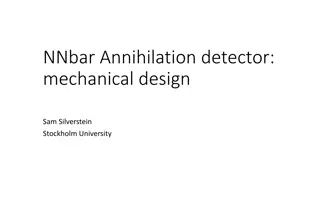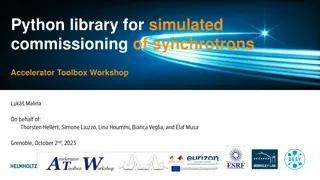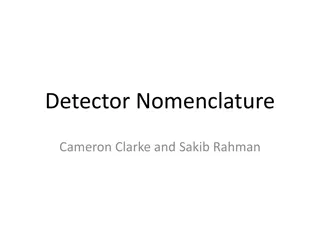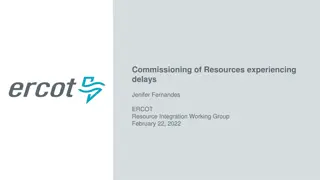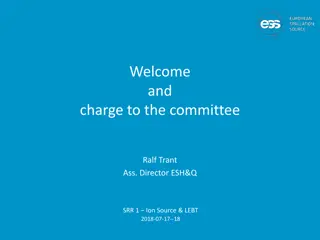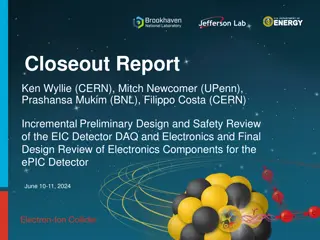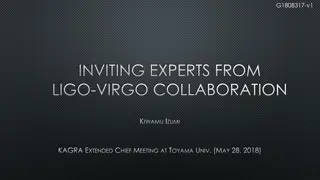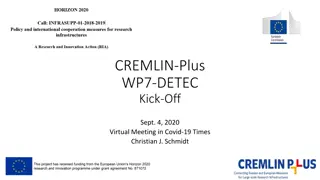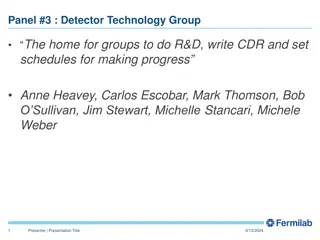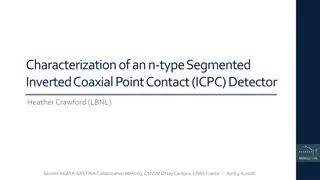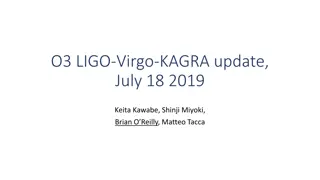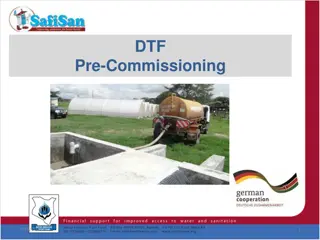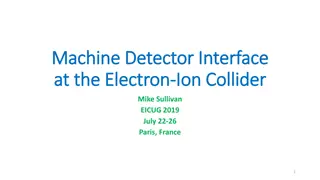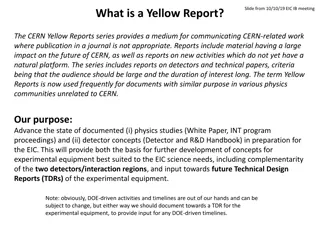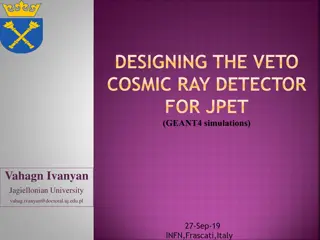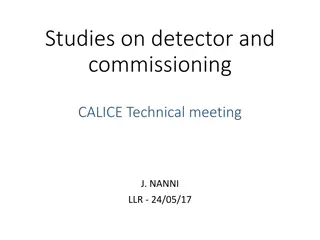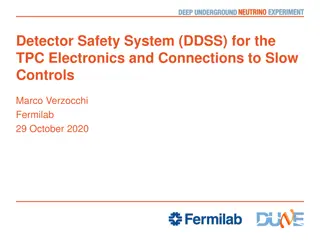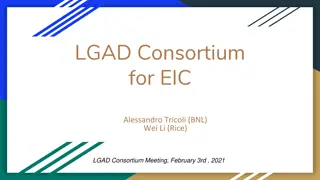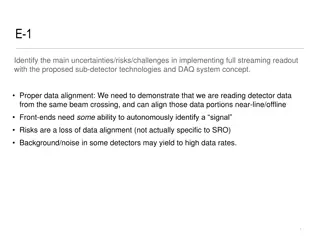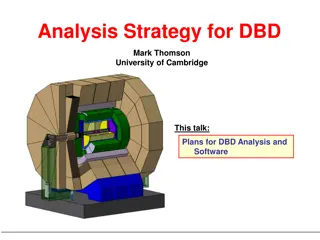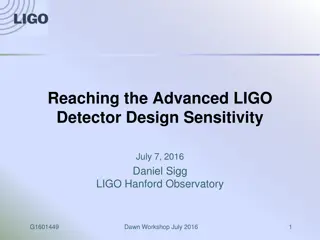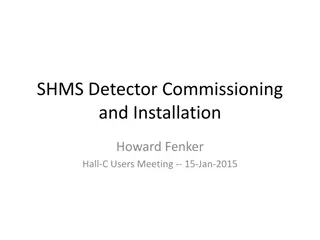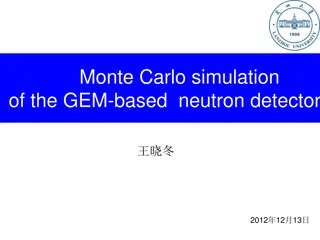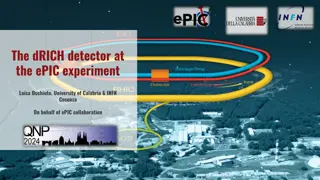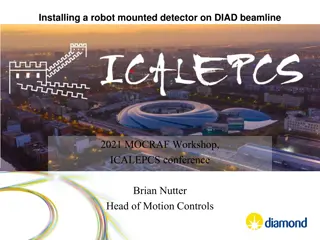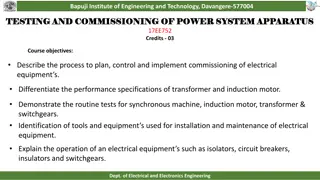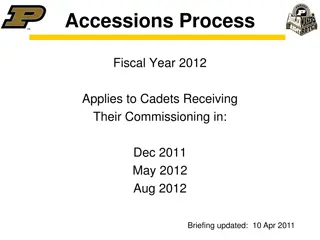ECFA Detector R&D Roadmap and International Collaborations Update
The ECFA Detector R&D Roadmap outlines collaborative efforts in particle physics research, focusing on high-field magnets, muon beams, and more. Task Forces are coordinating community consultations for future experimental programs, with a goal to fulfill strategic needs identified by the ESPP update
0 views • 28 slides
NNbar Annihilation Detector Mechanical Design Proposal
This proposal outlines the mechanical design considerations for the NNbar Annihilation Detector, highlighting practical concerns and proposed changes to the baseline design. Topics cover the structure support, component weights, installation challenges, and optimizations for improved detector perfor
2 views • 27 slides
Rapid Review of BSL Commissioning Arrangements by Dr. Michael Brady
NECS commissioned a Rapid Review of British Sign Language (BSL) service provision to identify areas for improvement in access and patient experience, especially during the Covid-19 pandemic. The review focused on stakeholder engagement, options appraisal for commissioning responsibility, and recomme
9 views • 19 slides
ACT Health Commissioning Community Sector Update - August 2, 2023
Join the Health System Planning and Evaluation team for the ACT Health Commissioning Community Sector Update on August 2, 2023. The session aims to discuss and showcase health sector reform activities, focus on community health services commissioning, and explore opportunities for quality developmen
5 views • 31 slides
Python Library for Simulated Commissioning of Synchrotrons Accelerator Toolbox Workshop
This workshop presented by Lukas Malina introduces a Python library for simulated commissioning of synchrotrons, focusing on commissioning simulations using AI translation from Matlab. The Python library aims to replicate machines with random errors, provide correction methods, and enhance performan
0 views • 15 slides
Effective Strategies for Co-Production in Commissioning Process
Commissioning involves needs assessment, analysis, design planning, procurement, delivery, monitoring, and evaluation. Effective commissioning is person-centered, outcome-focused, inclusive, well-led, and promotes a diverse and sustainable market. Meeting needs through co-production is essential, in
0 views • 12 slides
Advanced Detector Nomenclature and Proposed Segmentation System
This content provides detailed information on detector nomenclature, parts, and a proposed segmentation system for advanced spectrometers. It includes visuals and explanations of ring, septant, coil, and segment identification within the detector, offering insights into the intricate workings of spe
0 views • 4 slides
ERCOT Resource Integration Work Group Updates
The ERCOT Resource Integration Working Group discusses delays in commissioning resources, including challenges with supply chains and equipment damage. Various scenarios are presented, such as partial commissioning requests and requirements for unit approvals. The document outlines procedures for ap
0 views • 11 slides
Understanding Commissioning Zones and Safety Procedures
In the commissioning phase of a project, it is crucial to establish clear commissioning zones to distinguish between construction and commissioning areas. Blue and white flagging, boundary isolations, and permits play key roles in ensuring the safety and controlled energization of circuits and equip
0 views • 12 slides
Safety Readiness Review of Ion Source & LEBT Commissioning Process
Safety Readiness Review (SRR) is crucial for the commissioning and operation of the Ion Source and Low Energy Beam Transport (LEBT) system. The review ensures safety across all aspects, including radiation and environmental safety. The commissioning process is scheduled to begin on September 3rd, 20
0 views • 7 slides
Closeout Report: Incremental Design Review of EIC Detector Electronics
Closeout report detailing the progress of the Incremental Preliminary Design and Safety Review of the EIC Detector DAQ and Electronics, along with the Final Design Review of Electronics Components for the ePIC Detector. The report includes responses to charge questions, panel reviews, comments, reco
0 views • 23 slides
Neutrino Detectors for NuStorm: Physics Goals and Detector Requirements
Physics goals for neutrino detectors in the NuStorm project include measuring exclusive neutrino cross sections, supporting long baseline programs, searching for sterile neutrinos, and improving measurements. Detector requirements involve reconstructing neutrino interactions, providing charge and pa
0 views • 21 slides
Planning for Commissioning Experts Exchange Program
Initiating discussions on inviting experts from LIGO-Virgo Collaboration to assist with commissioning activities at KAGRA. Budget sources and possible programs identified. Key considerations include determining who to invite, when, and how to apply for the exchange program. Past experiences with Vir
0 views • 6 slides
WP7-DETEC Kick-Off Meeting: Advancing Detector Technologies for Particle Physics
WP7-DETEC is a collaborative initiative focusing on the development of state-of-the-art detector technologies in the fields of nuclear physics and high-energy physics. The kick-off meeting aims to foster cooperation, exchange ideas, and educate young scientists in the field. Activities include sessi
0 views • 7 slides
Detector Technology Group: Research & Development Strategies
The Detector Technology Group focuses on R&D for detector technology, setting schedules to make progress. Discussions include short-term approaches for describing detectors, collaboration participation, and decision-making. Activities at CERN and Fermilab are reviewed to address any missing R&D area
0 views • 8 slides
Innovative n-Type Segmented Inverted Coaxial HPGe Detector Study
Comprehensive characterization of an n-type Segmented Inverted Coaxial Point Contact (ICPC) detector by Heather Crawford at the AGATA-GRETINA collaboration meeting. The study focuses on energy resolution, drift time corrections, azimuthal angle and full position reconstruction, along with in-beam ch
0 views • 29 slides
Update on O3 LIGO-Virgo-KAGRA Project and Commissioning Plan Milestones
Updates on the O3 LIGO-Virgo-KAGRA project, including detector performance, alerts, retractions, and the upcoming commissioning break. The status and milestones of KAGRA commissioning plan are also outlined, with details on noise hunting, beam alignment, cooling systems, and other key activities.
0 views • 8 slides
Understanding Commissioning Process and Youth Engagement
This content covers training on commissioning processes, aims to involve young people in decision-making, and highlights the importance of effective communication and problem-solving skills. Various activities like ice breakers and group agreements are explored to engage participants in understandin
0 views • 22 slides
Community Commissioning Collaborative Design Workshop - August 9th
The Community Commissioning Collaborative Design Workshop on August 9th focuses on sexually transmissible infections and blood-borne viruses public health regulation. The workshop includes sessions on health services commissioning, viral hepatitis, and HIV, aiming to address emerging needs and prior
0 views • 7 slides
Pre-Commissioning and Commissioning Activities Overview
Understanding the process of pre-commissioning and commissioning in a treatment unit to ensure all systems are operational and ready for use. Learn about the activities involved, from preparation to treatment processes, including primary and secondary treatments. Explore the key steps such as inocul
0 views • 13 slides
Challenges and Considerations in Electron-Ion Collider Detector Development
Exploring the development of detector systems for Electron-Ion Colliders (EIC) involves addressing various issues such as detector acceptance for low Q2 and high Q2, unique beam characteristics, and the need for specialized components like bend magnets and polarimeters. Key considerations include po
0 views • 16 slides
Communication Strategies and Reports for Advancing Physics Studies and Detector Concepts at EIC
CERN Yellow Reports provide a platform for sharing impactful work related to CERN, including reports on detectors, technical papers, and new activities. The goal is to advance physics studies and detector concepts in preparation for the EIC, focusing on quantifying physics measurements, implications
0 views • 10 slides
Designing Veto Cosmic Ray Detector for JPET Using GEANT4 Simulations
Creating the Veto Cosmic Ray Detector for JPET involves designing the current version of Veto JPET, incorporating 42 scintillators, detecting 4 GeV cosmic muons, generating cosmic muon distribution, and simulating energy deposition inside the veto scintillators. The process includes particle generat
0 views • 26 slides
Commissioning Services for Women and Families in ACT: AOD Policy Workshop
Workshop on commissioning services to meet the needs of women and families in the ACT, focusing on key areas like young people, lived experience, AOD, and mental health. The session aims to inform the approach to non-government AOD services from 2024 and seeks collaboration with stakeholders. The Co
0 views • 25 slides
Understanding the National Commissioning Board
The National Commissioning Board plays a crucial role in enhancing our understanding of integrated commissioning and the foundations of integrated services. This board aims to address challenges faced by regional partnership boards and focuses on analyzing approaches to commissioning across agencies
0 views • 13 slides
Understanding Detector Response in SIDIS He3 Experiment
Introduction to analyzing hit and occupancy rates from different particle sources in the SIDIS He3 experiment. Explore the simulation data to determine event rates based on detector channels. Examples include pi0 sources and eDIS from the target. Various occupancy cuts are applied, and thresholds ar
0 views • 22 slides
Studies on Detector and Commissioning at CALICE Technical Meeting
Investigating issues with the mechanical structure and power supply of a detector, this study discusses disassembly, relocation, and potential solutions to address the BCID problem. Recommendations include adding more SLABs and implementing mechanical elements for stability. Commissioning of the SLA
0 views • 10 slides
Detector Safety System (DDSS) for TPC Electronics and Connections to Slow Controls
The Detector Safety System (DDSS) for TPC Electronics involves multiple protection levels including slow controls, PLC-based systems, and fuses/diodes to ensure detector safety. It's crucial to consider these aspects during the design phase as modifications post-design are challenging. The system, d
0 views • 20 slides
LGAD Consortium for EIC: Advancing Detector Technologies
The LGAD Consortium aims to foster the development of detector technologies based on LGAD sensors for the Electron-Ion Collider (EIC) and future projects. By creating a collaborative effort, sharing expertise, and bringing together those interested in LGAD-based detectors, the consortium seeks to ad
0 views • 9 slides
Challenges and Common Solutions in Implementing Full Streaming Readout for Sub-Detector Technologies
Implementing full streaming readout with proposed sub-detector technologies and DAQ system concept poses challenges including proper data alignment, risks of data loss, and background noise affecting data rates. The transition point for electronic components from detector-specific to common solution
0 views • 9 slides
Development of Silicon Tracker and Sensor Technology for sPHENIX Detector
Research and development efforts are underway for silicon tracker and sensor technology to enhance the functionality of the sPHENIX detector. The project aims to improve mass resolution, cover specific areas effectively, and optimize sensor configurations. Various sensor concepts are being explored
0 views • 25 slides
Analysis Strategy for DBD by Mark Thomson - University of Cambridge
Mark Thomson from the University of Cambridge presented the analysis strategy for the Dual-Beta Detector (DBD) at the ILD Analysis Meeting in Paris, focusing on software models, reconstruction, and validation plans. The strategy includes goals to ensure required physics analyses, develop software mo
0 views • 11 slides
Challenges and Plans for Reaching Advanced LIGO Detector Sensitivity
The presentation outlines the challenges and strategies for enhancing the sensitivity of the Advanced LIGO detector. It discusses the plan to interleave commissioning with observation runs, set sensitivity goals for early runs, and address major challenges like low-frequency noise and increasing las
0 views • 15 slides
SHMS Detector Commissioning and Installation Updates
Status updates on the commissioning and installation progress of the SHMS detector system, including the noble gas Cerenkov mount optics, mirrors, drift chambers, and various hodoscopes. Details on the system status, high voltage signal cables, DAQ, gas computing, and schedules for detector installa
0 views • 9 slides
Monte Carlo Simulation of GEM-Based Neutron Detector and Detector Performance Analysis
A detailed exploration of Monte Carlo simulations for GEM-based neutron detectors, investigating their detection efficiency and performance characteristics. Various detector designs and concepts, including multi-layer converters and GEM detectors, are discussed, along with simulation results on sign
0 views • 12 slides
Performance Studies of dRICH Detector at ePIC Experiment
The Electron-Ion Collider ePIC experiment focuses on the performance studies of the dRICH detector for particle identification crucial in various physics channels. The detector features aerogel optimization, SiPM sensors, and test-beam analyses. Key capabilities include different techniques for part
0 views • 28 slides
Installation of Robot-Mounted Detector on DIAD Beamline
Installing a robot-mounted detector on the DIAD beamline for the 2021 MOCRAF Workshop at the ICALEPCS conference. The robot arm holds a diffraction detector for dual imaging and diffraction purposes, ensuring safety for personnel, equipment, and integration into EPICS and GDA systems. Functionality
0 views • 28 slides
Guide to Collaborative and Engaging Activities for Commissioning
This guide provides insights on collaboration in commissioning, emphasizing transparency, inclusivity, and shared decision-making. It outlines methods for collaborative design, such as co-design, co-production, and incorporating lived experiences. The guide helps in selecting activities that engage
0 views • 12 slides
Electrical Equipment Testing and Commissioning Course at Bapuji Institute
This course at Bapuji Institute of Engineering and Technology in Davangere focuses on testing and commissioning of power system apparatus. It covers planning, controlling, and implementing commissioning processes, as well as performance specifications of electrical equipment like transformers and in
0 views • 12 slides
Accessions Process FY 2012 for Cadet Commissioning
The Accessions Process for Fiscal Year 2012 applies to cadets receiving their commissioning between Dec 2011 and Aug 2012. Cadets must excel academically, athletically, and as leaders to be selected for commissioning. The process involves evaluating GPAs, APFT scores, LDAC performance, and more to d
0 views • 44 slides

